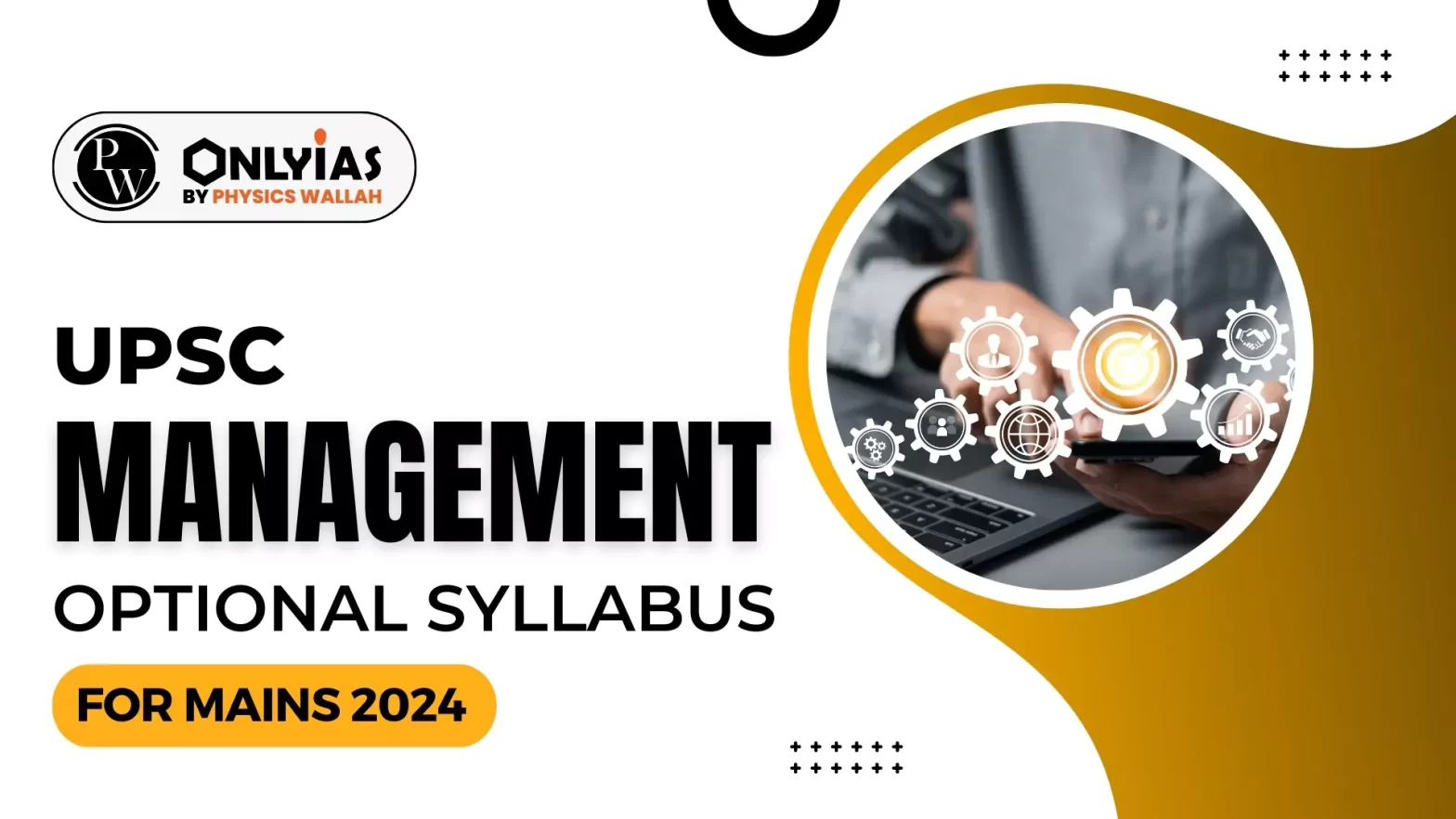![]() Aditi Sinha
Aditi Sinha
![]() July 01, 2023 10:10
July 01, 2023 10:10
![]() 3398
3398
![]() 0
0
Get comprehensive insights into the UPSC Management optional syllabus for CSE Mains 2024, along with past year question papers (PYQs) and essential books, aiding aspirants in thorough preparation for the exam.

This article aims to serve as a comprehensive guide for the UPSC Management optional syllabus for upcoming CSE Mains 2024 examination. We also provide access to past year question papers (PYQs) to help aspirants comprehend the type of questions posed and the depth of analysis expected by the UPSC.
While preparing for the UPSC (Union Public Service Commission) CSE examination, selecting an appropriate optional subject is crucial to maximising one’s success potential in the exam. Among the diverse array of optional subjects offered by UPSC, Management optional subject emerges as a notable choice for aspirants with a background or keen interest in business, management principles, and organisational behaviour. In this article, we will delve into the various aspects of the Management optional, examining its syllabus, past question papers, and resources that can aid in thorough preparation.
As per the official notification of UPSC, candidates opting for Management as their optional subject are encouraged to study the development of Management as both a science and an art. Management as a science emphasises a systematic, analytical approach to solving organisational problems and making strategic decisions, grounded in empirical evidence and quantitative analysis. In contrast, Management as an art focuses on the creative, intuitive, and human-centric aspects of leading and motivating individuals, recognizing the importance of emotional intelligence, vision, and interpersonal skills. By integrating these perspectives, aspirants are better prepared to apply these principles to real-world scenarios in government and business, adapting to the rapidly changing strategic and operational environments.
| Particular | Details |
| Total Papers | Two, Paper I and Paper II |
| Total Marks | 500 (250 Each) |
| Time Allowed | 3 Hours for each paper |
| Sections | Section A and Section B |
| Questions | Total 8 questions with subparts |
| Compulsory Question | Question No. 1 and 5 |
| Marks Distribution | Questions may include 10, 15, and 20 marker questions |
The Management optional syllabus for the UPSC examination is meticulously designed to evaluate the candidates’ grasp of core management concepts and their proficiency in applying these concepts to practical situations. The syllabus encompasses an extensive array of topics that cover various dimensions of management, including organisational behaviour, human resource management, finance, marketing, and strategic management among others. Below, we will dissect the syllabus for Paper 1 and Paper 2 to provide a clearer understanding of the subjects covered.
The Table below contains the syllabus of Management Optional for the UPSC Optional Paper I:
| Area of Study | Topics Covered |
| 1. Managerial Function and Process |
|
| 2. Organisational Behaviour and Design |
|
| 3. Human Resource Management |
|
| 4. Accounting for Managers |
|
| 5. Financial Management |
|
| 6. Marketing Management |
|
The Table below contains the syllabus of Management Optional for the UPSC Optional Paper II:
| Area of Study | Topics Covered |
| 1. Quantitative Techniques in Decision-making |
|
| 2. Production and Operations Management |
|
| 3. Management Information System |
|
| 4. Government Business Interface |
|
| 5. Strategic Cost Management |
|
| 6. International Business |
|
For aspirants selecting Management as their optional subject in the UPSC exam, choosing the right resources is essential to grasp the subject comprehensively and cover the syllabus effectively. Management covers a broad array of topics, including Organizational Behavior, Human Resource Management, Financial Management, Marketing Management, and Strategic Management, requiring an extensive set of books for in-depth preparation. Here is a curated list of essential books for Management Optional Paper I and Paper II, designed to facilitate candidates’ study.
| S.No. | Book | Author(s) |
| 1 | Management: Theory and Practice | G.A. Cole |
| 2 | Organizational Behavior | Stephen P. Robbins |
| 3 | Human Resource Management | Gary Dessler |
| 4 | Financial Management: Theory and Practice | Prasanna Chandra |
| 5 | Marketing Management | Philip Kotler |
| 6 | Operations Management | Jay Heizer and Barry Render |
| 7 | Strategic Management and Business Policy | Thomas L. Wheelen and J. David Hunger |
| 8 | Corporate Governance | Robert A.G. Monks and Nell Minow |
| S.No. | Book | Author(s) |
| 1 | International Business: Competing in the Global Marketplace | Charles W. L. Hill |
| 2 | Competitive Strategy: Techniques for Analyzing Industries and Competitors | Michael E. Porter |
| 3 | Production and Operations Management | Martin K. Starr |
| 4 | Management Information Systems: Managing the Digital Firm | Kenneth C. Laudon and Jane P. Laudon |
| 5 | Quantitative Analysis for Management | Barry Render, Ralph M. Stair Jr., and Michael E. Hanna |
| 6 | Financial Institutions Management: A Risk Management Approach | Anthony Saunders and Marcia Millon Cornett |
| 7 | Consumer Behavior: Buying, Having, and Being | Michael R. Solomon |
| 8 | Corporate Finance | Jonathan Berk and Peter DeMarzo |
| 9 | The Leadership Challenge | James M. Kouzes and Barry Z. Posner |
| 10 | Strategic Market Management | David A. Aaker |
The table below contains the direct PDF links of the Previous Year Question Papers of Management Optional Paper I and Paper II:
| UPSC CSE Management Optional PYQ 2023 | |
| UPSC CSE Management Optional Paper I (2023) | UPSC CSE Management Optional Paper II (2023) |
| UPSC CSE Management Optional PYQ 2022 | |
| UPSC CSE Management Optional Paper I (2022) | UPSC CSE Management Optional Paper II (2022) |
| UPSC CSE Management Optional PYQ 2021 | |
| UPSC CSE Management Optional Paper I (2021) | UPSC CSE Management Optional Paper II (2021) |
| UPSC CSE Management Optional PYQ 2020 | |
| UPSC CSE Management Optional Paper I (2020) | UPSC CSE Management Optional Paper II (2020) |
| Must Read | |
| NCERT Notes For UPSC | UPSC Daily Current Affairs |
| UPSC Blogs | UPSC Daily Editorials |
| Daily Current Affairs Quiz | Daily Main Answer Writing |
| UPSC Mains Previous Year Papers | UPSC Test Series 2024 |
<div class="new-fform">
</div>

Latest Comments